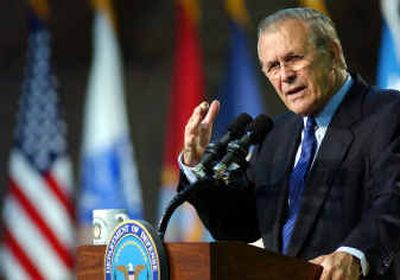Exchange with soldier may ruin Rumsfeld

WASHINGTON – Defense Secretary Donald Rumsfeld has always been a lightning rod for controversy, but his icy exchange with an American soldier over why troops in Iraq don’t have adequate armor for their vehicles could be his undoing.
Rumsfeld has weathered plenty of criticism, but his remarks have provoked fury among fellow Republicans, rank-and-file soldiers, influential military thinkers and retired brass who’ve generally supported his handling of the wars in Iraq and Afghanistan and his efforts to reshape the military.
The secretary’s brusque dismissal of Spc. Thomas Wilson’s concerns, however, raises questions about whether he’s publicly betrayed the trust of the men and women in the armed forces and whether they’ve lost faith in his leadership.
It remains to be seen whether President Bush will continue to stand by Rumsfeld or decide that he’s become too much of a political liability.
“What made Rumsfeld’s response to the soldier’s question a turning point was that it crystallized concern about his attitude and performance that has been growing for years,” said Loren Thompson, the head of the Lexington Institute, a defense policy group that has long supported Rumsfeld but has become increasingly critical. “Rumsfeld’s abstract, dismissive response to the soldier’s question was very much in character, but it underscored the lack of political sensitivity and accountability that many feel have characterized his tenure,” Thompson said.
Dissatisfaction with Rumsfeld on Capitol Hill has been brewing for years, but with this latest misstep, critics finally might have found the chink in the armor, Thompson suggested.
Almost daily for the past week, one Republican after another has come forward to criticize Rumsfeld. Sen. John McCain of Arizona, a maverick who’s often butted heads with the administration, told the Associated Press on Monday that he had no confidence in Rumsfeld. Other critics included Sens. Chuck Hagel of Nebraska, Trent Lott of Mississippi, Susan Collins of Maine and Norm Coleman of Minnesota. Many Republicans had been reluctant to raise such concerns before November’s elections.
Early on, Rumsfeld was predicted to become one of the first casualties of the new Bush administration, primarily because of his efforts to rein in generals who had become accustomed to a broad degree of autonomy under President Clinton and who had largely come to distrust their civilian leaders.
Bush promised to restore that trust, and soon after the Sept. 11 attacks, Rumsfeld became one of the most visible images of steely-eyed American resolve as he promised to visit the full weight of American military fury on the al Qaeda terrorists who planned the attacks and the Taliban regime that harbored them in Afghanistan.
While the results of that campaign were mixed – American soldiers are still dying in Afghanistan in a low-level insurgency waged by the remnants of the toppled Taliban regime and their al Qaeda allies – Rumsfeld soon raised hackles with his public dismissal of the Geneva Conventions, which require humane treatment of prisoners of war, and his public humiliation of Army chief of staff Gen. Eric K. Shinseki, who told the Senate it would take several hundred thousand troops to keep a grip on Iraq after Saddam Hussein was deposed.
Rumsfeld has since weathered the public criticism over his failure to plan for an insurgency. He’s also survived the Abu Ghraib scandal last spring and the continuing revelations over how American troops have abused prisoners there and in detention centers in Afghanistan and at the U.S. naval base at Guantanamo Bay, Cuba.
After his reply to the soldier in Kuwait, Rumsfeld told Fox radio he thought the soldier’s question was fair, “and it seems to me that the Department of Defense owes every person – that is, they volunteer to go in and serve their country – and we owe them to see that we can get everything they need and do everything humanly possible to see that that’s done.”
His explanation might not be enough to allay concerns in the ranks. A leader who conveys disregard for his or her troops’ well-being no longer can lead effectively.
“I can see how that specialist might perceive it as arrogant and essentially saying, ‘I don’t care whether you live or die,’ ” said retired Maj. Gen. Robert Hughes, deputy commander of 1st Army (Reserve) from 2001 to 2004. “He has absolutely no credibility with the soldiers anymore, and remember they are the ones who are out there pulling the triggers.”